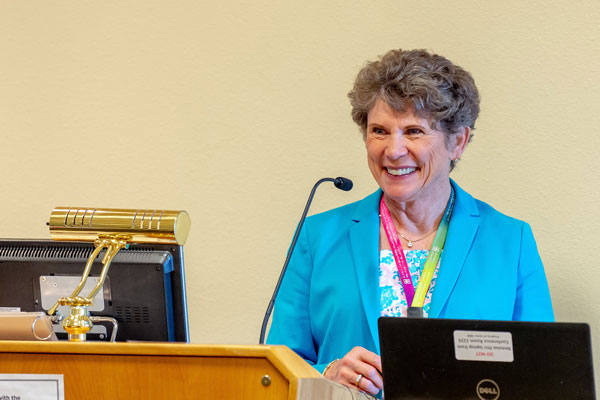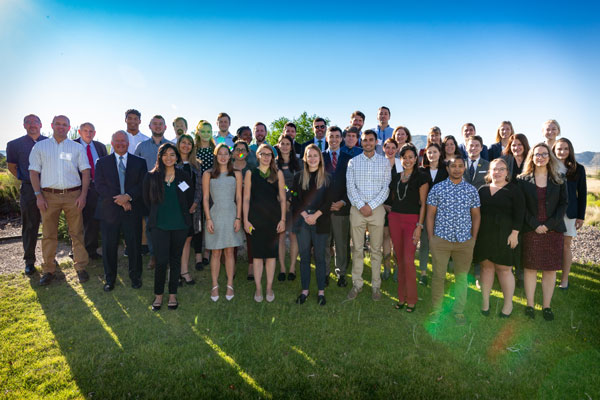
The Project on Nuclear Issues conducted one of its four annual conferences at Sandia’s Center for Global Security and Cooperation on July 9-10. Sandia Deputy Labs Director Dori Ellis opened the conference with remarks on Sandia’s history, and Associate Labs Director for National Security Programs Mike Burns hosted a lunch. A simulated war game in which teams engaged in a “what if” nuclear war scenario kicked off the second day’s events.
See below: What is PONI?
The 2019 Summer conference featured rich analyses on a range of prominent issues affecting nuclear weapons strategy, including the impact of long-range missiles and an evaluation of new technologies. Nuclear weapons in space and all their implications were discussed, with topics including space security and how machine learning can affect nuclear command, control and communication.
This year’s keynote speaker was Annette Totten, director of the National Counterproliferation Center, which leads the intelligence community and interagencies to prevent the proliferation of weapons of mass destruction, their delivery systems and related technologies and expertise. Previously, Totten served as the deputy director for national intelligence management at the National Counterterrorism Center.

Conference attendees included Ambassador Linton Brooks, former NNSA administrator; Jacquelyn Schneider of the Naval War College; colleagues from other national laboratories, universities, military and federal agencies; and about 60 junior- and senior-level Sandians.
“It was a great opportunity to see so many people from across the National Security Enterprise here at Sandia,” Dori said. “PONI provides a remarkable opportunity for critical thinking about nuclear issues for all national security professionals.”
The highly anticipated simulated war game started early on day two of the conference, and attendees were assigned various roles, including executive, secretary of defense, secretary of economics, secretary of intelligence and others. Players had to decide how to invest their capabilities or partner with others in order to achieve their objectives.
The simulated war game helped teams understand the impact of cyber operations on international stability while exploring the relationship between new technologies, domestic politics, conventional military capabilities and nuclear threats.
What is PONI?
PONI was created in 2003 as a networking program to bring together junior and senior nuclear weapons professionals from the Nuclear Security Enterprise. Its annual conferences include networking events, new idea forums and deep dives into current nuclear policy, strategy and actions.
Three of the conferences (summer, fall, winter) are held at national laboratories, military institutions, or the Center for Strategic & International Studies headquarters in Washington, D.C. The Capstone Conference, held each spring at the United States Strategic Command in Omaha, Nebraska, highlights top presenters from the three previous conferences.
This conference series is an opportunity for emerging experts to learn about policy or technical aspects of the NSE, to develop and present new ideas and to engage with other nuclear issues professionals. These discussions include far-reaching implications of nuclear policy and discussions on nuclear weapons infrastructure, operations and strategy.
PONI is one of 53 Center for Strategic & International Studies research programs and one of the Center’s four educational objectives, which include:
- The Nuclear Scholars Initiative, which aims to develop recent graduate students and young professionals related to nuclear issue decision making.
- The Mid-Career Cadre, to provide mid-career professionals with education and developmental opportunities.
- The Next Generation Nuclear Network, geared to provide guest authors with an online forum to publish their analyses.
- The PONI quarterly conference series.
As of January 2019, 18 Sandians have participated in the Nuclear Scholars Initiative and five have participated in the Mid-Career Cadre program. Those who are interested in learning more about the PONI conferences can contact Darrla Giersch or visit the PONI conference website.